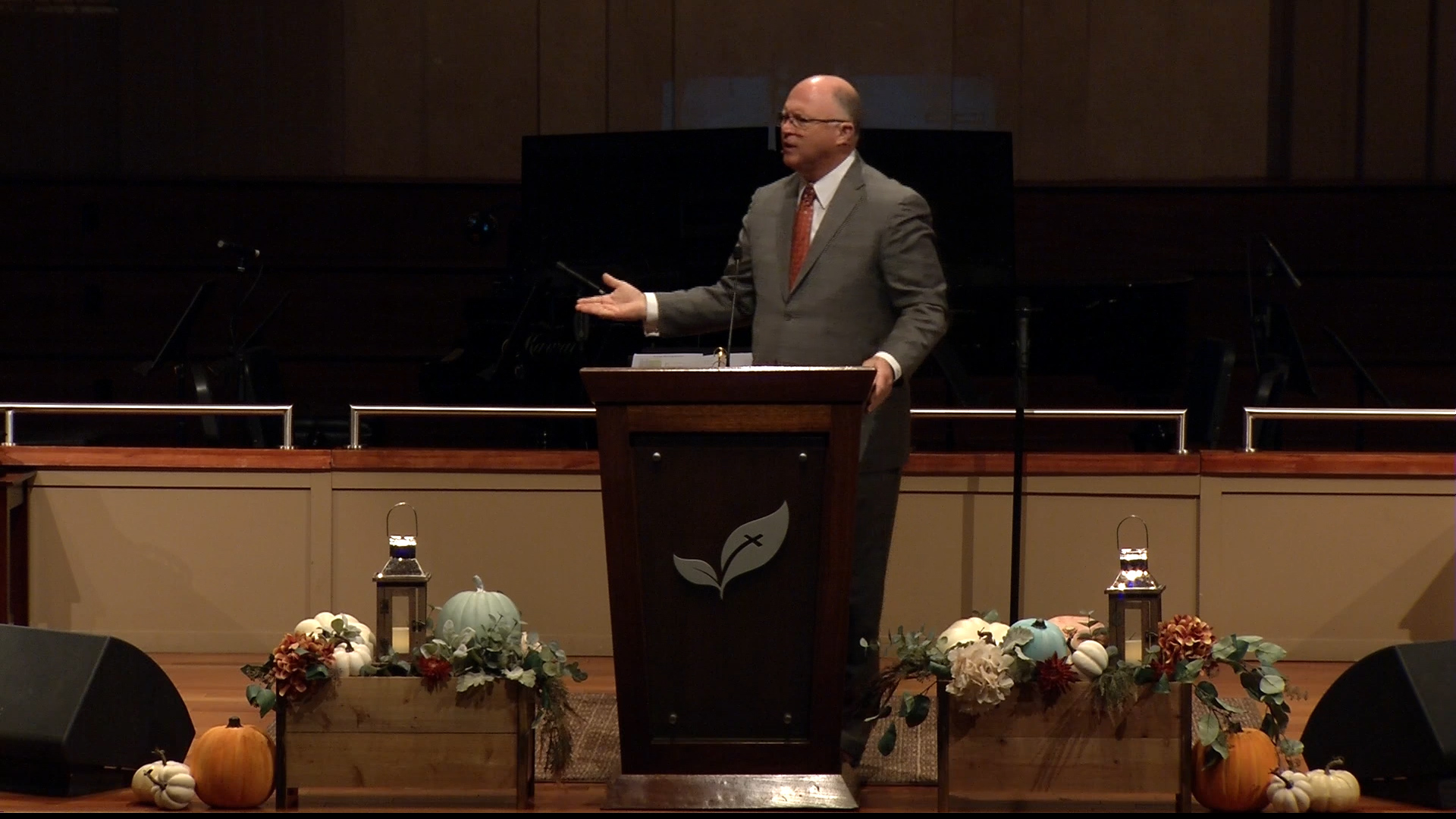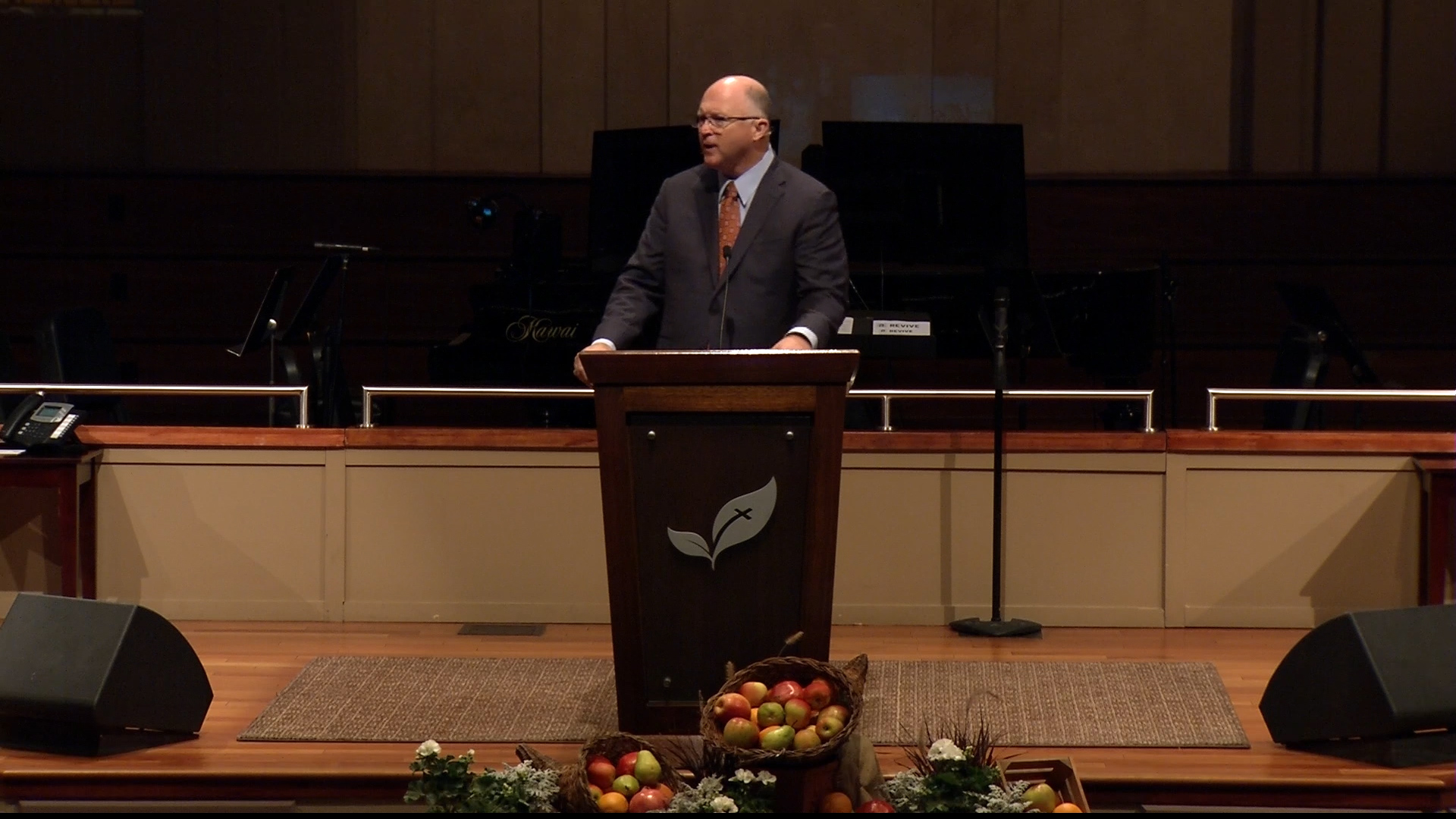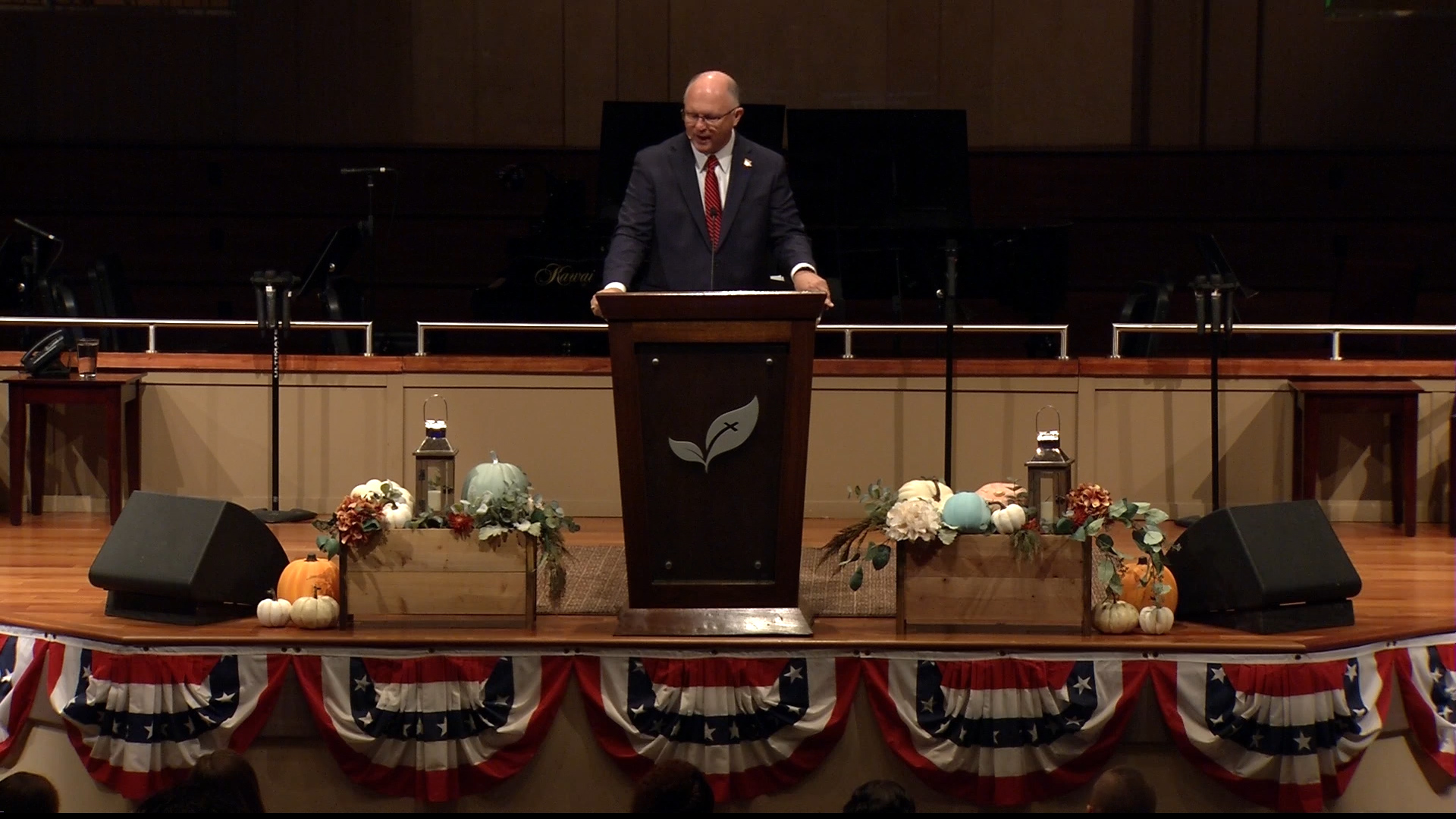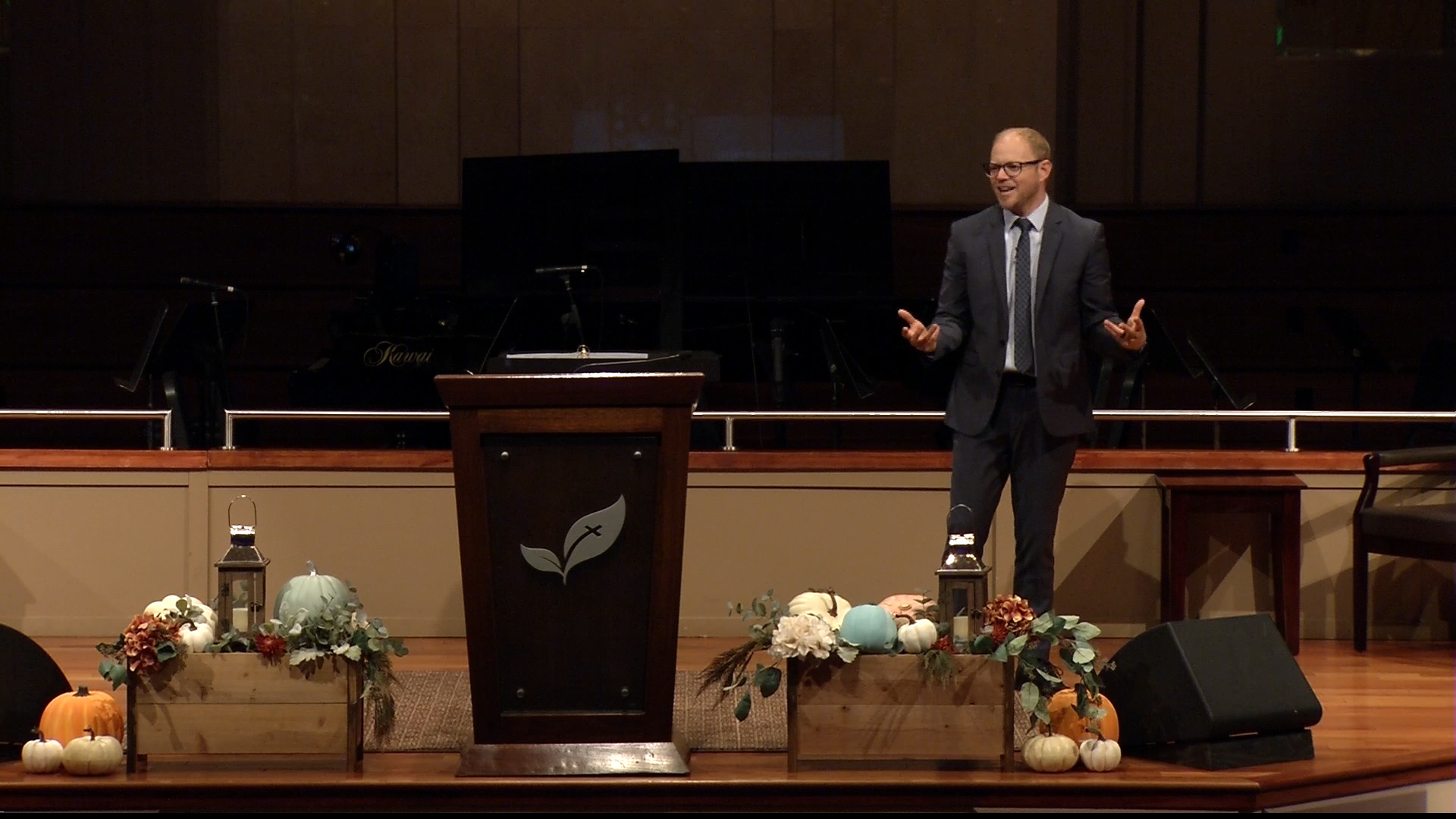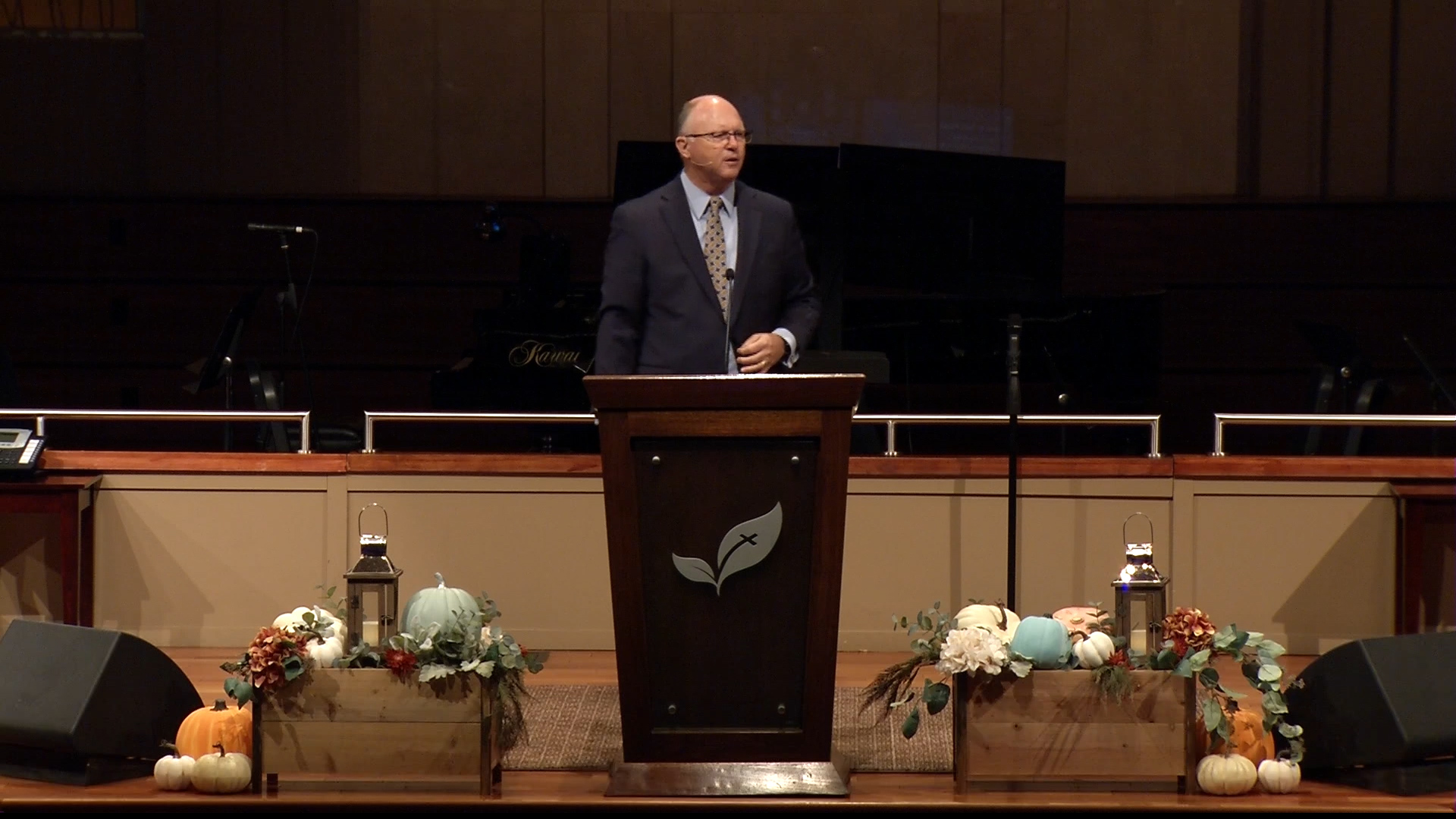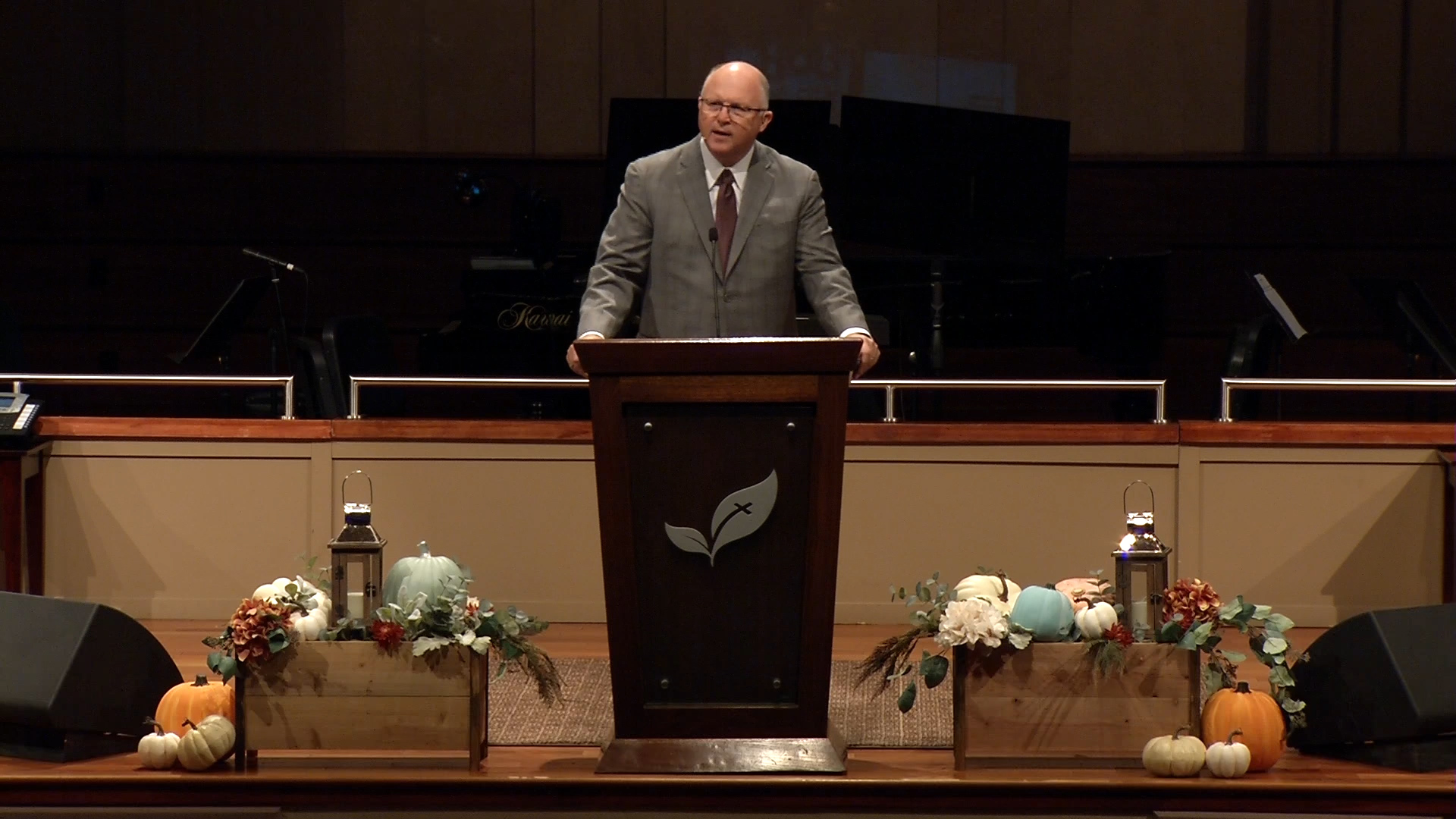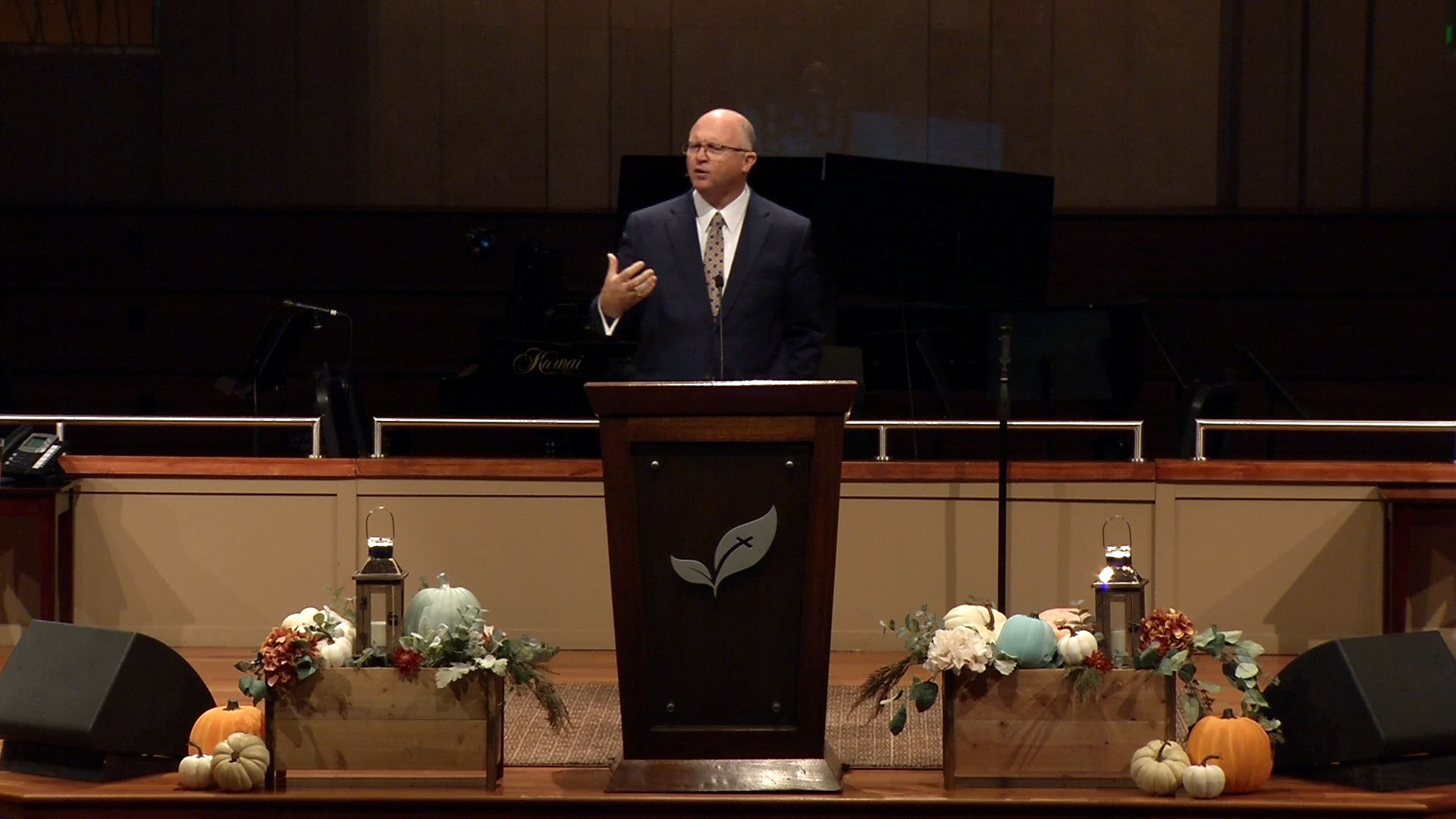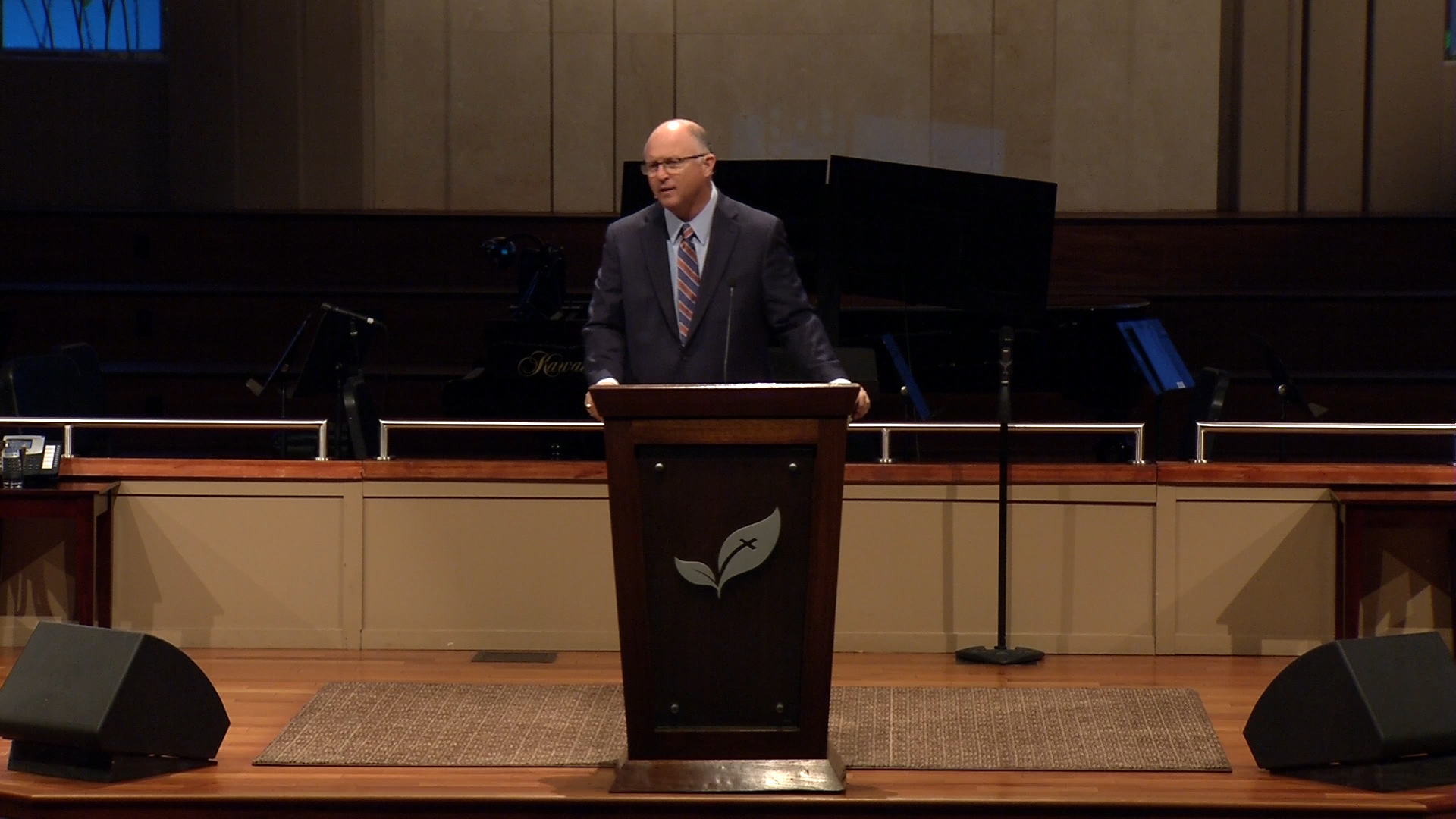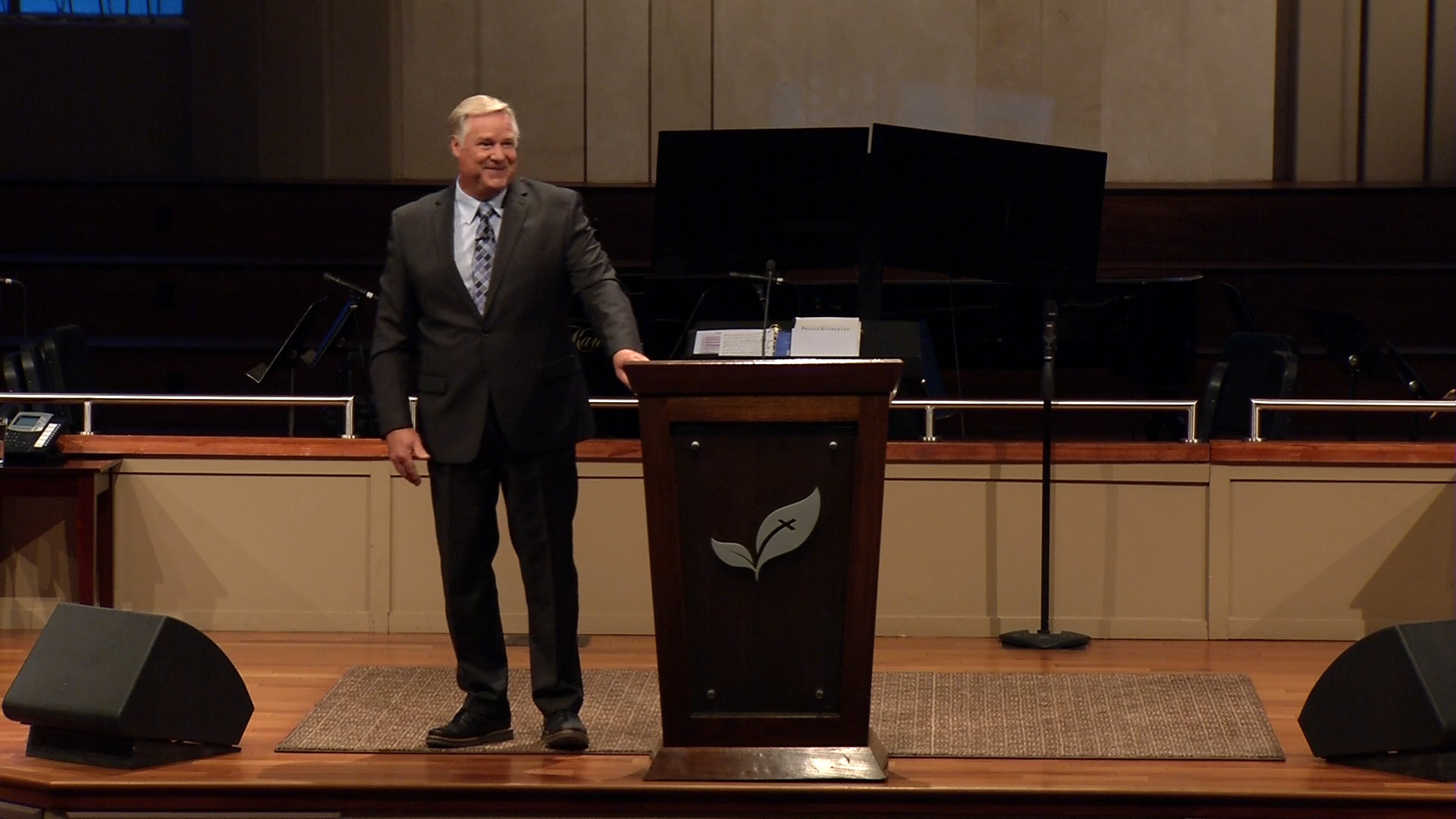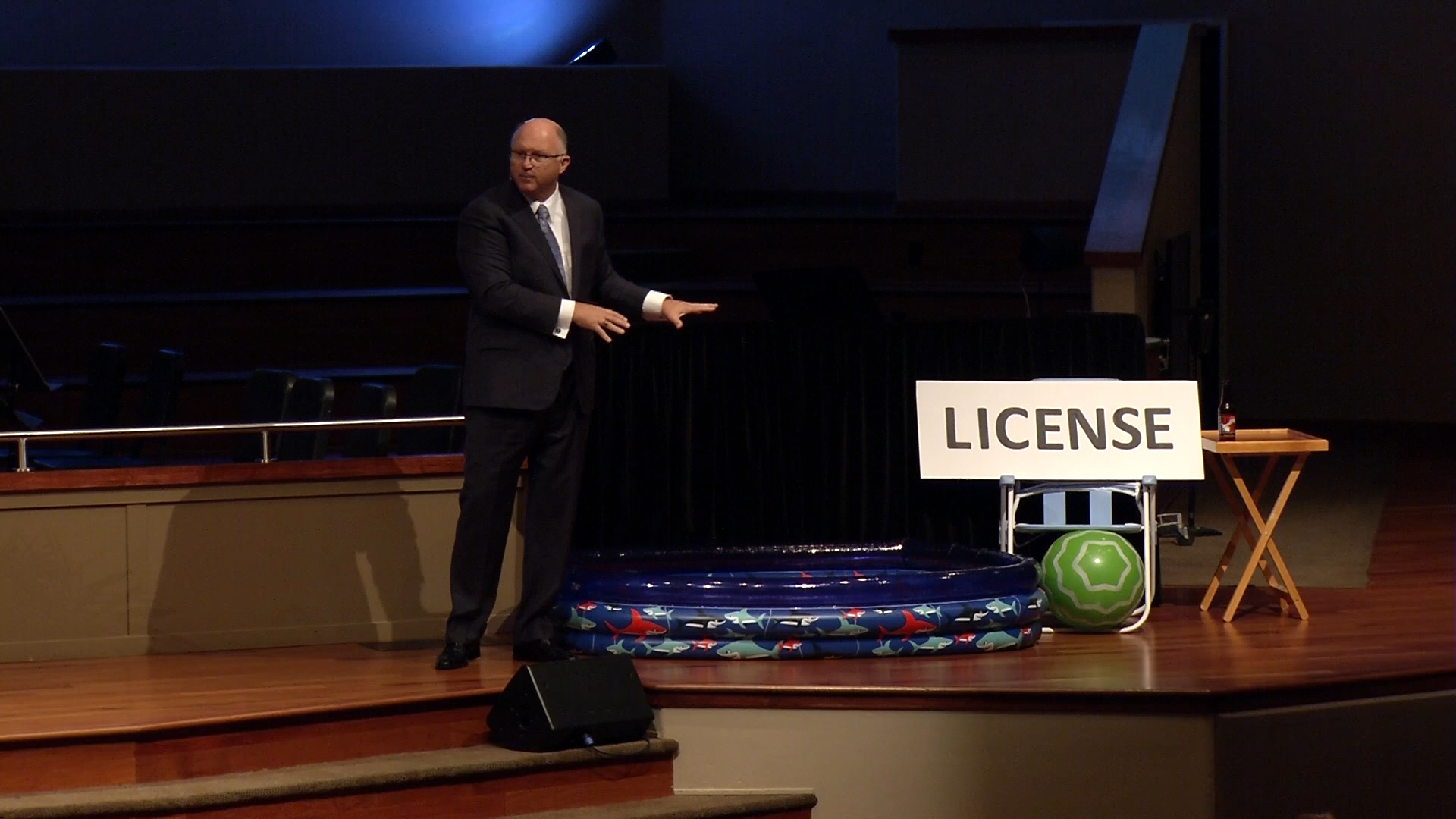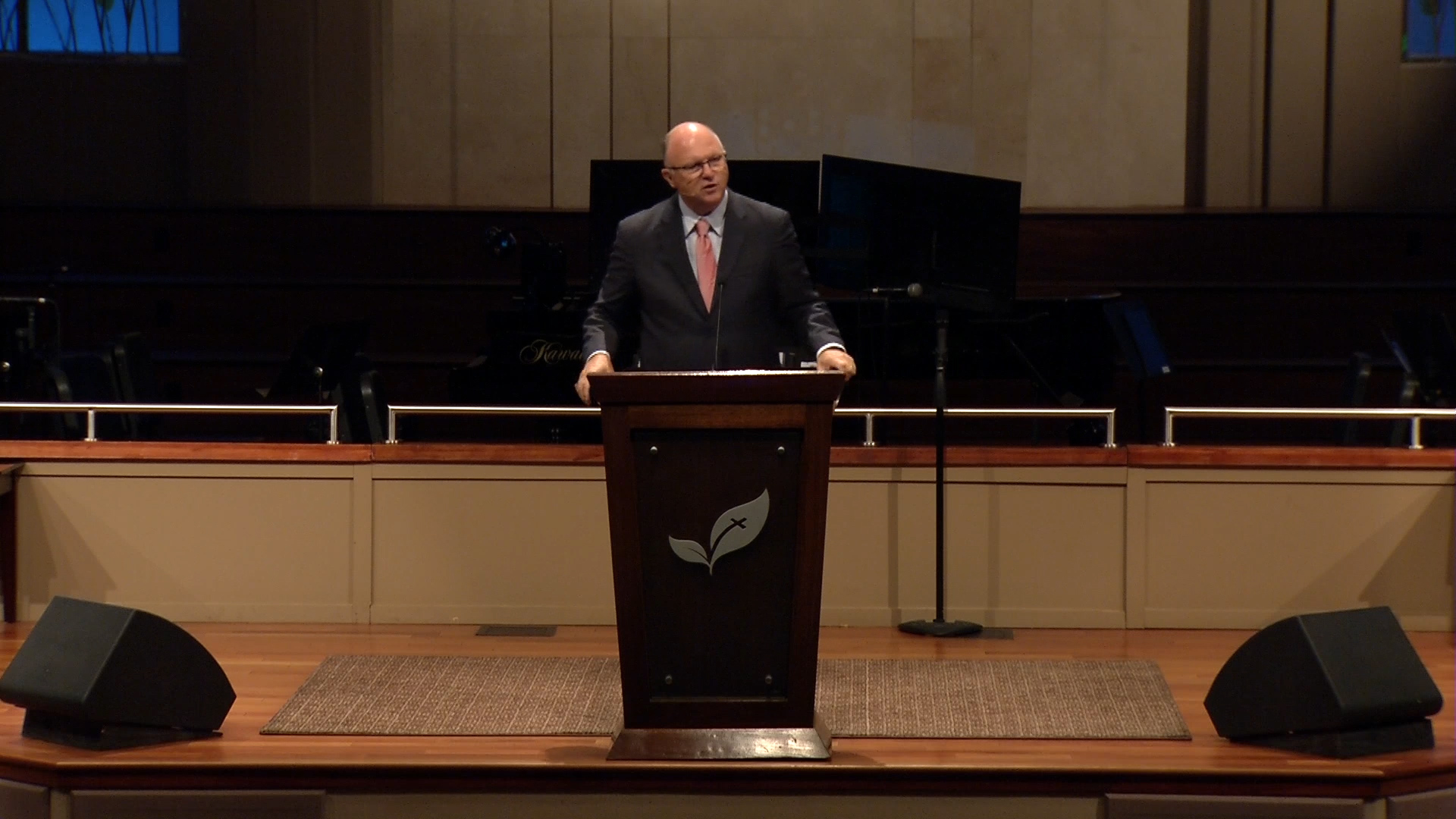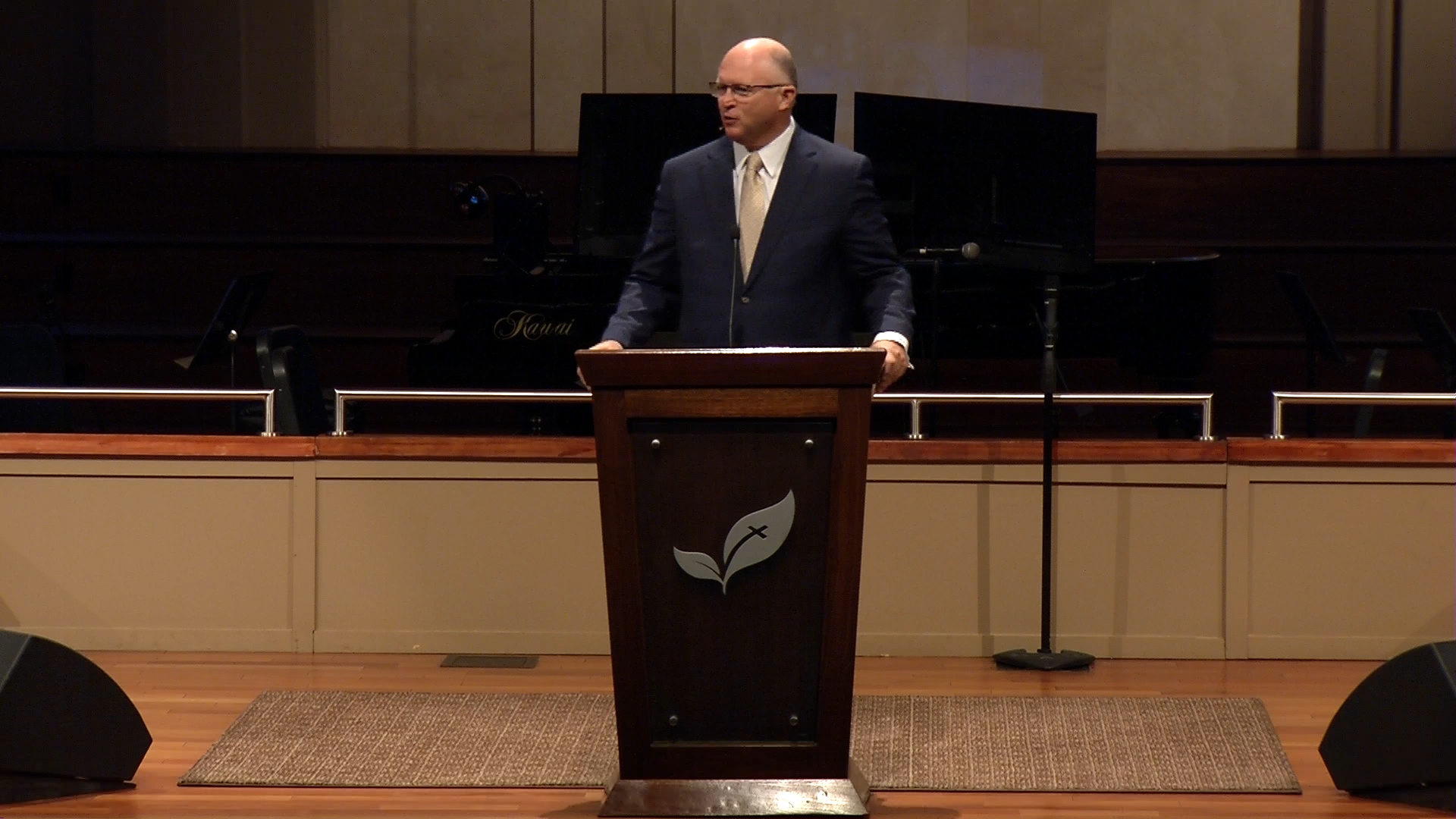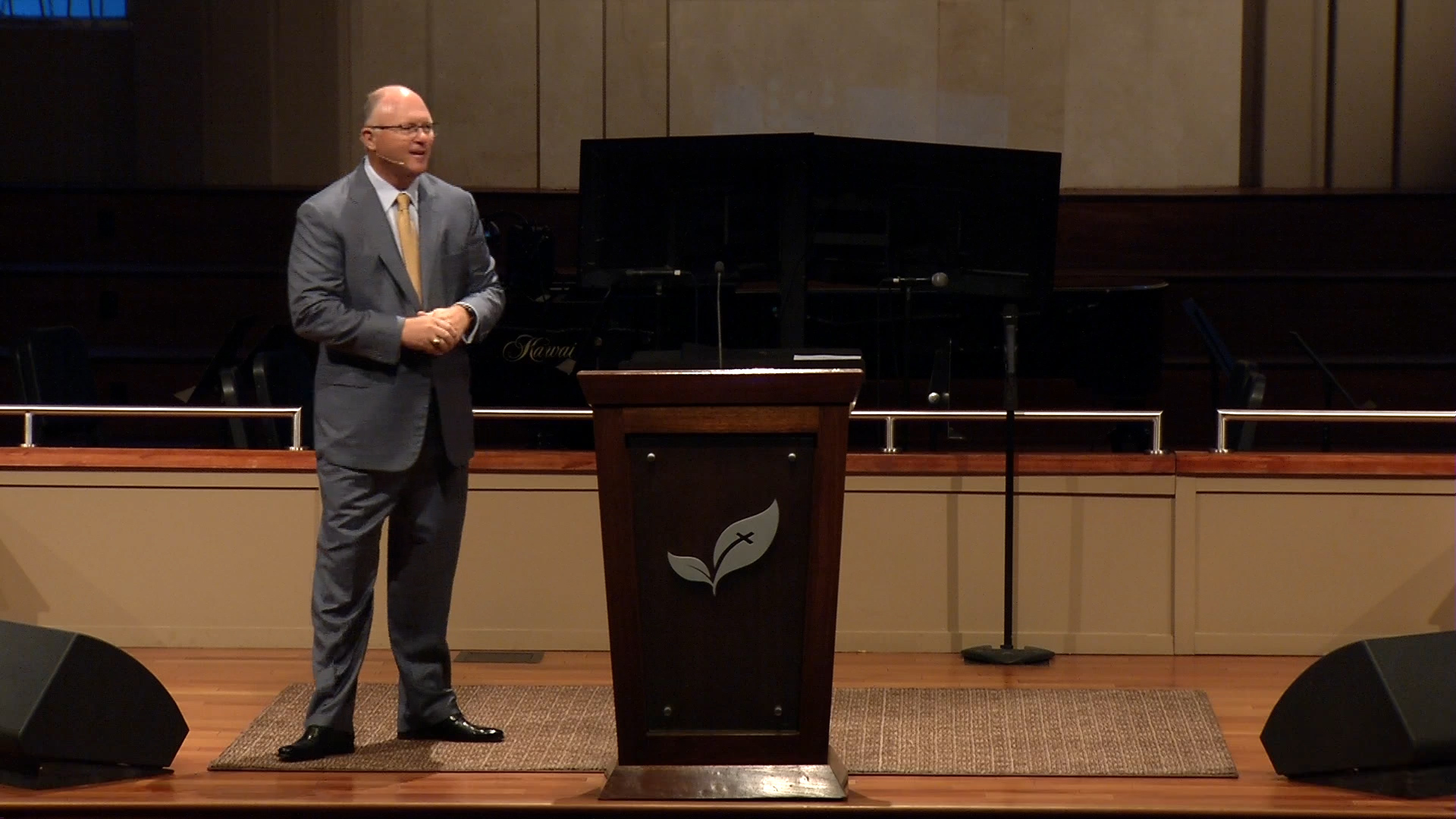Take your Bibles and turn to John's gospel, John 13. And we're excited about this series, one. Another, last week we learned that we're members one of another, and this morning we're going to learn about loving one another. And for the next 12 weeks we're going to find every time in the Bible where it tells us how to treat one another what we're supposed to do. And if you'll be here through these weeks I believer you'll find a strengthened marriage, you'll find a strengthened ministry, you'll find a strengthened Sunday school class; it's going to help us across the board. And so, let's stand together today and turn to John's gospel, and we're going to look at chapter 13 for our Scripture reading this morning, and we're going to learn about loving one another.
By the way, you can be strong in convictions and still be loving in your spirit; and in fact, that's exactly what Jesus wants from us. And so, let's learn about that in John 13:31. And if you don't have a Bible you can find in the bulletin all the notes for today's message.
"Therefore when he was gone out, Jesus said, 'Now is the Son of Man glorified, and God is glorified in him. If God be glorified in him, God shall also glorify him in himself, and shall straightway glorify him. Little children, yet a little while I am with you. Ye shall seek me: and as I said unto the Jews, "Wither I go, ye cannot come"; so now I say to you. A new commandment I give unto you, that ye love one another; as I have loved you, that ye also love one another. By this shall all men know that ye are my disciples, if ye have love one to another.'" Let's pray together.
Father in heaven, we thank you for the clear teaching of our Lord Jesus this morning. And, Lord, as you were preparing for Calvary you wanted your church to encourage and love each other. And, Lord, we pray that we would get ahold of that truth, Father, that we would be known at Lancaster Baptist as a place with an intense loving spirit, and Lord, that you would be glorified even in this day, even in this service, is our prayer, in Jesus' name. Amen. You may be seated.
Well, the highest example of love the world has ever seen is the example of the cross of Jesus Christ. It is the example of the life and the sacrifice of the Lord Jesus Christ. And we all know that man's concept of love so many times is shallow, it is not enduring. In fact, there's different Greek words for the word "love," and one of those words speaks of just erotic love, and a very sensual, shallow kind of a love that uses people. There's another word that is the word phileó, it is the word "brotherly love." It's kind of like a friend and kind of the guy you sock in the shoulder, that type of thing.
But then we come to the word today: agapé love. We find that Jesus calls us to a higher kind of a love, he calls us to a biblical love. And every one of us have experienced, perhaps, in our lives relationships where after a while we realize, "Wow, this isn't really based on the highest kind of love. This was based on another kind of love that isn't really going to be the kind of love that pleases God." And sometimes that lesser love kind of wears off over time.
I always like the story of the guy that went in and he had surgery, and he was under all the medication. He's laying there on his bed, and after a while he kind of opened his eyes a little bit, and there was his dear wife standing at his side just praying for him just right there – picture of a perfect wife. And he looked up at her and he said to her, he said, "You are beautiful," and then he kind of dozed back off.
And after a while he woke up again and there she was again, and he looked up at her and he said, "You are cute." And she said, "What happened to beautiful?" and he said, "The anesthesia's wearing off." And there are some people like that, you know. It seems like the wrong kind of love wears off, but the right kind, the Christlike kind of love will go on forever and forever.
Now interesting to me is the fact that in John chapters 1-12, we read about the entire ministry of Jesus Christ. We read of a three-and-a-half-year ministry in those first twelve chapters. But when we come to the final seven chapters of John's gospel, we are reading about one 24-hour period. So we're going to begin a section of John's gospel here that literally is going to encompass the final hours of the life of Jesus Christ. And we're going to see in this particular moment that, while Jesus knew he had 24 hours left before he died upon the cross, while he knew that he would undergo terrible torture and the wrath of God would be placed upon his body while he bore in his body our sins.
And Jesus, knowing all of that, gathers his disciples together in what is known as the upper room, and he brings them in this particular upper room for a purpose, and he brings them there amongst other things: to remind them of his commandment concerning love for one another. He had told them in Luke 22 that they would find this room and that it would be prepared for them. And so, now the twelve disciples gathered with Jesus Christ there in the upper room. It's a literal room, some believe still in existence. I have stood in this particular room in Jerusalem that they claim to be dating back to the first century; and you can see it's even popped with a lot of bullet holes from various wars. And you can see in this upper room that there was a gathering place, a large room that would have held a large table, and Jesus called his disciples there.
Now three things are going to happen in this upper room as we study John chapter 13 and Luke chapter 12. The synoptic Gospels put a picture together for us. The first thing that happens is the celebration of the Passover. And many of you have studied the Passover from the book of Exodus chapter 12, and you'll recall the story how that in Exodus chapter 12, God was bringing plagues upon the Egyptians, and there came the death angel through Egypt to take the firstborn. And God was judging Egypt for their polytheism, for their rejection of his truth, and their persecution of his people.
And God said to the Jewish people, he said, "If you will put blood on the doorposts and over the door, then when I see the blood I will," what does he say, "pass over you. I will pass over you." And so he spared the children of Israel during that time of plague in what became known as the Passover. And once a year, even today, there is the celebration of the Passover by the Jewish people.
Now we in the new covenant as Christians, we understand that Jesus is our Passover, and that he shed his blood on the cross, and that when we accept Jesus as our Savior, then God says to us, "Though we are sinners, when I see the blood of Jesus applied to your account I will pass over you, I will not judge you, you will not spend eternity in hell. You are covered by the blood of the Lamb of God, the Lord Jesus Christ." Isn't that good news this morning, that Jesus is our Passover Lamb?
So the first thing they did was to celebrate the Passover. The second thing – and this is amazing to me – is that Jesus in his last few moments with this small ekklesia, this called out group, this church, his disciples, he is going to do something phenomenal to me, and that is he is going to wash their feet. Now never in history did a rabbi wash the feet of the students, it was always the other way around. But look if you would in this chapter at verse 4. The Bible says, "He riseth from the supper, and laid aside his garments; and took a towel, and girded himself. After that he poureth water into a bason, and began to wash the disciples' feet, and wipe them with a towel wherewith he was girded."
You know, a lot of people have written in recent years about servant leadership – some religious, some secular authors. But always remember that the original servant leader was none other than the Lord Jesus himself. And here in a tremendous display of humility and love, Jesus Christ literally washes the feet of his disciples.
The third thing that's going to happen in this upper room is that they're going to observe, finally, what we would call the Lord's Supper, or Communion. And the Bible tells us about that in Luke 22, and I've placed it in your notes, and it says there, "He took the bread, and he gave thanks, and he brake it, and he gave unto them, saying, 'This is my body which is given for you: this do in remembrance of me.'" So Jesus is essentially saying to them, "I'm about to be glorified," we'll study that word in a moment. "I'm going to be leaving you; but I want you to remember me."
By the way, isn't it sad, in a sense, that we must have the Lord's Table periodically to remember him. Jesus was saying, "Don't forget me. I want you to remember me." And he said, "This bread, it represents my body which is about to be torn on the cross. And this cup, it represents my blood which is about to be shed on the cross."
Now as Christians today and as Bible believers, we do not believe that the cup and the bread are needed for salvation. We do not receive Christ when we receive the bread and the cup, we receive Christ when by faith we call upon him to be our Savior. In fact, Jesus says here in Luke chapter 22:19, he says, "This is my body which is given for you: this do in remembrance of me." We call it an ordinance. He's saying that, "When you take this bread, remember me." It's an ordinance; and it's not a way of salvation, it's a way of remembrance of Jesus Christ.
And so, three amazing things happen: they observe the Passover feast to remember what happened in Exodus; Jesus washes their feet to show them how to serve; and then they have the Last Supper, which was instituted by Jesus, and which we have even at this church nine or ten times a year on a Sunday night so that we can remember what Jesus did on the cross of Calvary.
Now in the context of this last meeting of the church in the upper room, I want you to see what Jesus begins to say as this final 24-hour clock starts ticking, and I want you to notice, first of all, if you're taking notes, the proclamation of Christ. The Bible says in verse 31, "Therefore, when he was gone out, Jesus said, 'Now is the Son of Man glorified, and God is glorified in him."
Now what does this mean, glorified: "The Son of Man is glorified"? And I want you to take note that he is speaking here of his death. He is speaking here of the fact that he is about to begin that 24-hour period where he will be betrayed, where he will be persecuted, where he will be beaten with a cat o' nine tails under the authority of Pontius Pilate, where he ultimately will go to the cross; and there on the cross he will be glorified; and because of the empty tomb, he will be glorified; and all of the death, burial, and resurrection of Jesus can be referred to as the glorification of Jesus Christ. But it began with his death.
And notice what he says in verse 33. He says, "Little children, yet a little while I am with you." He said, "I'm not going to be with you. We've been walking for three-and-a-half years, we have fed the five thousand, we have healed the blind, we have seen what could happen with the maniac of Gadara who was naked and running through graveyards, and cutting himself with knives. But we saw when he believed on me his life was changed." And they saw all these miracles, and Jesus said, "All of that's about to end now, because I'm not with you much longer." He said, "Just a little while longer am I with you." He says, "I'm about to be glorified." He's about to go to the cross of Calvary.
Now Warren Wiersbe said of this moment, "From the human perspective, the death of Christ was a dastardly deed involving unspeakable suffering and humiliation. But from the divine perspective, it was the revelation of the glory of God. For this moment as Jesus is on the cross is when the world will see that there is a Messiah who came down and who she his blood for the sins of the world, according to 1 John 2:2, that they all might be saved. And so, here Jesus offers himself as the covering for the sin of the world."
And isn't it amazing that even today, two thousand years later, that when we see a cross, we don't think of it as a symbol of some type of defamation or dastardly deed, but we see it as a glorious symbol of what Jesus Christ has done for us, especially when we see it without an idol on the cross or a statue on the cross, because it reminds us that we're on the winning side, because Jesus is no longer on the cross, he is in heaven at the right hand of God the heavenly Father. So his death is pictured as a part of his glorification.
But also when he speaks of his glorification, he speaks of his deity, he speaks of his identity. He's saying, "The world is about to know who I am. The world is about to see me for who I am, that I am not just some teacher, that I am not just some rabbi, but that I am truly the Son of God." You see, Jesus Christ became man. The Bible is very clear that he is eternal in his nature, but that he took the form of man, John 1:12, "But as many as received him, to them gave he power to become the sons of God, even to them who believe on his name." John 1:14, "And the Word became flesh, and dwelt among us, and we beheld his glory, as of the only begotten of the Father."
Jesus Christ is the eternal Word. But in Bethlehem's manger, deity was wrapped in humanity; and God took the form of a man in order that he might hang on that cross. And the glory was God was not only seen in the manger when the angels and the shepherds said, "Glory to God in the highest," but it was also seen when Jesus was on the cross; for Jesus Christ never ceased being God from the manger to the cross or to heaven where he is with the Father even today. And so, we understand that Jesus Christ is declaring his glorification in that he is God, Romans 1:4, "and declared to be the Son of God with power, according to the spirit of holiness, by the resurrection from the dead."
American Statesman Daniel Webster was once dining in Boston. And Daniel Webster was a wonderful Christian man, and perhaps that's why sometimes he is ridiculed in Hollywood productions. Someone turned to Daniel Webster and they said to him, "Mr. Webster, can you comprehend how Christ could be God and man?" and they were discussing Christianity.
And Mr. Webster promptly replied, "No, sir, I cannot comprehend it. If I could comprehend him, he would be no greater than myself. I feel that I need a super-human Savior. And I can't comprehend it either, I'm just thankful for the fact that God became man and dwelt among us, and went to the cross of Calvary; because if Jesus was just another man, there's no covering for my sin. But because he's the God-man, then his blood covers the sin of the whole world you see."
And that's the hope that we have in the glorification of Jesus Christ that he became man. And in doing this, he brought great glory to God the Father. Did you see that in verse 32? "If God be glorified in him, God shall also glorify him in himself."
God is glorified in the work of Jesus Christ. John 17:1, "These words spake Jesus, and lifted up his eyes to heaven, and said, 'Father, the hour is come; glorify thy Son, that they Son also may glorify thee." In verse 4, he says, "I have glorified thee on the earth: I have finished the work which thou gavest me to do."
Sometimes it amazes me to watch that every step of Jesus was a step of desiring to glorify God. I wonder about you this morning. Are you living your life to the glory of God today? Is everything you post and everything you say and everything you do to the glory of God, or is it to the glory of self?
Jesus wanted all the glory to go to the Father. This glorification was for the Father; and then it brought glory to the Son as well. But we see the proclamation of Christ when he simply says, "Now is the Son of Man glorified." He's saying to his disciples, "Listen, it's about ready to happen. Remember I said, 'Tear this temple down, and in three days I'll raise it up'? That's about ready to happen."
But notice, secondly, this morning: the exhortation to the church. Since he was about to leave – and, oh, we now know that the Comforter has come. We know that the Holy Spirit came and indwelt the church, and we're so thankful for that. But since he was about to leave, he says, "I've got something you must know," and he gives this command to love. He looks at the church and he commands them.
Look, if you would, at what the Bible says in verse 34. He says, "A new commandment I give unto you, that ye love one another; as I have loved you, that ye also love one another." Now the word "commandment" is an authoritative prescription. It's an injunction that Jesus Christ is giving to the church. And by the way, when Jesus gives a commandment we don't need to falter, we don't need to question, we just trust and obey.
Many times people today are leery of the commandments of the Bible and leery of the teachings of the Bible, and they want it to be given to them in a particular presentation. You know, my friend, all Scripture is given by inspiration of God. In fact, the very Bible is the living Word, it's Jesus Christ for us; and God's word is given to us that we might have an understanding of how we're supposed to live the Christian life.
And Jesus says it this way: "I have a new commandment for you." He says, "My commandment for you is that you would love one another." And he uses the word "commandment" because it is not optional, it is an imperative. It is something that we are told to do. He says, "I want you to follow my example in how to love. Greater love hath no man than this, that a man lay down his life for his friends." Jesus says, "I want you to love the way I love," and he says, "I want you to follow my motivation in loving. I want you to have the right reasoning behind your love." "The love of Christ constraineth us," 2 Corinthians 5:14, "because we thus judge that if one died for all, then we're all dead."
We're not here at Lancaster Baptist doing some type of performance and going through a bunch of lists and caught up in performances. I hope that you're here today because you love Jesus Christ today. I hope that you love others because the love of Christ is flowing through you, Galatians 2:20. It is my prayer today that as Jesus gives you the commandment that it will not just be another thing to check off of your list, "Well, I kept that commandment," but that you will be motivated by your love for Christ to love others in the name of Jesus Christ. Galatians 5:13, "For, brethren, ye have been called unto liberty; only use not your liberty as an occasion to the flesh."
Someone says, "Well, I'm under liberty, I'm under grace; I can do what I want." But God says, "No, don't do what you want; but by love, serve one another; for all the law is fulfilled in one word, even in this: 'Thou shalt love thy neighbor as thyself.'"
Some people in America, they go, "Well, I have freedom. I have the freedom of speech; I'm going to go burn a flag," and I would say, "That's the misuse of your freedom of speech. That's not what we do with our freedom."
But some Christians say, "Well, I'm under grace, and I have freedom to do what I want. I don't have to go to church that much. I don't need to read my Bible. Don't tell me this and that," and God says, "Wait a minute; don't use your liberty as an occasion to the flesh; but by love, serve one another."
What we ought to say is, "I'm free; I'm going to raise that flag high. I'm free; I'm going to lift up Jesus' name. I'm going to use my freedom to show the love of Jesus Christ," not the love of self, but the love of Jesus Christ. There must be proper motivation.
So Jesus commands us to love one another. And then he gives us the demonstration of love. Notice that in that verse there, verse 34, he says, "A new commandment I give unto you, that ye love one another; as I have loved you." He says, "The standard of the kind of love that I want you to show is the love that I have shown for you."
You see, love had come to another level with Jesus. Listen, Jesus had just washed their feet. Jesus was about to go to the cross and die for them, for us. He says, "I want you to love your wife like I love you. I want you to love your husband like I love you. I want you to love your children like I have loved you, in action, in humility, in sacrifice, as I have loved." The disciple of Jesus will stand out in the world because of this divine quality, this Christlike love.
Now when Jesus says, "As I loved you," think of how he loves you. By the way, how many of you believe that the Lord loves you this morning? Jesus loved us sacrificially. He demonstrated this love, 1 John 3:16, "Hereby perceive we the love of God, because he laid down his life for us: and we ought to lay down our lives for the brethren." He said, "I laid my life down for you."
Seventeenth century England, Oliver Cromwell was involved in a great military campaign. And there was much happening in the country at that time, even for the advancement of the gospel; and yet, still a brutal time, a bloody time. And there was a sojourner, Cromwell, that had gone AWOL, he had stolen, and so he had been sentenced to death at the ringing of the bell in the evening. A common practice for criminals, when the bell was rung, then the executioner would come, and they would oftentimes summon the executioner, and they would either shoot or somehow hang the criminal soon as the bell rang.
Well, it was time for the bell to ring, and the man began to pull the rope and pull the rope, and yet no sound, no sound at all. They began to inspect to see what happened, and what they had found was the fiancé of the young soldier had climbed up into the bell tower and had wrapped her body around the clapper so that as hard as the rope was being pulled her body was going back and forth, back and forth, her skull slamming against the bell, her ribs slamming against the bell. And finally, they brought her down to stand before Cromwell; and when asked about her actions she showed her bloodied hands and arms, her skull. She showed that it was because of her love that she had prevented the striking of the bell. And Oliver Cromwell said, "Your lover shall live because of your sacrifice; curfew shall not ring tonight."
And do you understand how much Jesus loves you? Do you understand that when the judgment bell should have rung that Jesus Christ went to the cross of Calvary, and there he shed his blood, and there he suffered as the Roman soldiers put a spear through his side and nails through his hands, and a crown of thorns upon his head? Do you understand that Jesus took your pain and mine in order that we might have the covering for our sin and a home in heaven? And Jesus says, "That's how much I loved you. Now love one another with that love."
Jesus could, perhaps, have said, "I'm not going to be here to get you guys to stop squabbling, so you love one another." To me, it's a very sad thing when Christians are ungracious one towards another. Sometimes very conservative Christians, unkind. Sometimes those who think they've had some grace awakening, just as critical of the other crowd. Can I tell you something? It's never right to be unloving to a brother or sister in Christ. Jesus said, "Love one another."
Oh, sometimes there's Christians that have a different slant on how they do things, and sometimes there's Christians that do things we would not practice here, and sometimes there's Christians that just bug you because of things that they do. But God says, "I want you to love them as I loved you."
Don't just love your wife when she is doing exactly what you want. Don't just love your children when they're making straight A's. God says, "I want you to love them with a sacrificial love. Husbands," he says, "loves your wives, even as Christ also loved the Church and gave himself for it," you see. Love sacrificially. Love righteously.
May I say very quickly that God's love is not a permissive love to say, "Oh, just keep on sinning, that's okay." God's love is a righteous love. He says, "Let your love abound with knowledge and wisdom," in Philippians.
And there was a woman once that was caught in the very act of adultery and she was thrown down at Jesus' feet, and the Pharisees said, "Now what are you going to say about that?" And Jesus looked at the woman, in John chapter 8 and verse 10, and he said, "When Jesus had lifted up himself, and saw none but the woman, he said unto her, 'Woman, where are those thine accusers? Hath no man condemned thee?' And she said, 'No man, Lord.' And Jesus said unto her, 'Neither do I condemn thee: go, and sin no more.'" Now Jesus did not condone her sin, but Jesus did not condemn her as a person.
Please understand that God in his infinite wisdom can love a sinner without condoning their sin. And as a church, we must never embrace the sins of the culture, but we must always embrace the sinners of the culture. We might not agree with certain lifestyles or actions, and we must see in the Scripture that we're to avoid those things; but we must always love others with a Christlike love. He loves sacrificially and righteously.
And you know what else I love about Jesus: he loves us constantly, he never stops loving us, it's not a part-time thing with him. The Bible says in Romans 8:38, "For I am persuaded, that neither death, nor life, nor angels, nor principalities, nor powers, nor things present, nor things to come, nor height, nor depth, nor any other creature, shall be able to separate is from the love of God, which is in Christ Jesus our Lord."
My friend, it doesn't matter if you came from a broken home, an abusive home, and you never knew the Lord until you were later in life. It doesn't matter what your background is or what you've done. There is a God in heaven who sent his Son who loves you and will never stop loving you. It's an infinite, everlasting, constant love.
And so, he says to us as Christians, "Charity suffereth long, and is kind; charity envieth not; charity vaunteth not itself, it's not puffed up. It doth not behave itself unseemly, it seeketh not her own, it is not easily provoked, it thinketh no evil; rejoiceth not in iniquity, but rejoiceth in truth; beareth all things, believeth all things, hopeth all things, endureth all things."
Sometimes I hear about people that are Christians who are married, and someone says, "I'm out of this, I don't love him anymore." I say, "Wait a minute; with God all things are possible. God has commanded us. Listen carefully: with God's commandments come God's enablements. So God would not command you to love someone that he cannot enable you to love them. God will not tell you to do something that you cannot do, that's why he gave us his Holy Spirit. And the fruit of the Spirit is – you see, dear lady, it's not about can or can't, it's about will or won't."
"You see, sir, it's about, 'Will you yield to the Holy Spirit or you won't yield to the Holy Spirit.' But when I yield to his Spirit and his word, I then can keep his commandments, because with his commandments come his enablements." Would you say that with me? With his commandments comes his enablements.
"Pastor, are you saying that it is possible for me to love him?" That's exactly what I'm saying; because if Jesus could love us, then it definitely is possible. Jesus says, "I'm about to be glorified, so let me give you this exhortation: love one another, even the way I loved you. That's how I want you to love one another."
Then I want you to notice, finally this morning, the identification of love. Something starts to happen when people live this out. They are noticed in a good godly way when they begin to do what Jesus tells them to do here. Look at verse 35: "By this," by this love we could say, "by this shall all men know that ye are my disciples, if ye have love one to another."
Now God doesn't say, "They're going to know because you put a bumper sticker on the car, they're going to know because you join a church," because in America we know how to do religious stuff without love." A lot of Christians I know do a lot of religious stuff, but they're not loving in the way that they should be. So God says, "I don't want your characteristic, your strongest characteristic to be architecture or how you decorate your car or even your house. I want you to be characterized by how you treat one another, because you might not even have a car, and you might not even have a house, but you can have this love." And he says, "By this love everyone's going to know that you're one of mine, that you have been saved."
Now notice, first of all, there will develop an outward testimony, an outward testimony: "All men will know." Now sometimes we look at people and we might know them by certain things: what they drive, or what they wear, or how they curse so much, or what kind of bad jokes they tell. People get a testimony one way or the other by how they act. So God says, "I want people to watch you, and I want them to know that you're different because you know me."
I often tell our teenagers, "Be careful about the friends you choose." I often tell our church members, "Be careful about your friends on social media, because nearness is likeness." And there's great influence, and there's great power in some of those relationships. How many of you then would say, "It's only logical that if your best friend is Jesus, then your life will be radically different and more loving because of your relationship with Jesus"? Or is Jesus just somebody we talk about at church and your relationship is really with church?
But if you know him as your personal Savior, and if you love him and know his love, then you'll begin to have an outward testimony, and it looks like this, 1 John 3:17, "But whoso hath the world's good, and seeth his brother have need, and shutteth up his bowels of compassion from him, and how dwelleth the love of God in him? My little children, let us not love in word, neither in tongue; but in deed and in truth." So God says, "Now, if you are reflecting my love and you see there's a need, then your heart is to see the need and take the lead." Let's say that together: "See the need and take the lead."
That's what Jesus did. Every need he saw. He took the lead to impart love, healing, forgiveness, and hope. James 2:15, "If a brother or sister be naked, and destitute of daily food, and one of you say to them, 'Depart in peace, be warmed and filled'; notwithstanding ye give them not those things which are needful for the body; what doth it profit?"
I mean, how's the world going to look at you being like every other American, stingy and materialistic and non-giving? How's the world going to look at that and say, "Oh, I see Jesus in that"? They're not going to see Jesus in that. So God says, "When you see the need and when you begin to take part, when you learn what it is to give, and when you learn what it is to serve and to wash feet, then people are going to take note of your life, and they're going to see Jesus in you, because that's just not the norm in today's culture to see that."
After billionaire hotel owner Leona Helmsley died several years ago, she left several trusts and wills and such. One of the trusts that she developed was for her dogs. It was a $12 million trust fund to provide luxurious care for her dogs until their death. She also left enough money so that when her dogs died they could be buried next to her in a $1.4 million mausoleum that she had designed for them. Her will also stipulated and funded so that there would be the washing of the mausoleum at least twice a year. It reminds me of some churches that I see on the East Coast who deny the deity of Christ. They deny all the truths of Jesus Christ, but they've been heavily endowed to keep the building clean at least.
And she said, "I want to keep my dogs' burial clean." And so she left an additional $3 million to cover that tab of cleaning the mausoleum. Meanwhile, she cut her grandchildren out of the will and trust, saying, quote, "They know why." How many of you, first of all, are glad she's not your grandmother, right? And, secondly, I mean, they know why. I mean, that would just probably bug me the rest of my life. "I do? What did I do?" "They know why."
Now, having told you that little story about Ms. Helmsley, how many of you would agree with me the woman loved her dogs? Because where your treasure is, there will your heart be. This woman loved her dogs. And I see people all the time who love their dogs. They carry them around. They carry them in restaurants. They carry them on airplanes. And I'm not against dogs, and I'm not against loving your dog.
But what I want to know is, do you love Jesus? And what I want you to know is when you love Jesus, you're going to love more than dogs, you're going to actually love people, even grandkids that bug you, because that's what Jesus does. Jesus changes hearts, because we realize no one's deserving of love, including me. But God loved me anyways.
So how can I express the love of Jesus to someone else today? You see, when you love people who are like you, that's ordinary. But this author said when you love people are unlike you, that's extraordinary. And when you love people who dislike you, that's revolutionary.
An outward testimony begins to develop, and the outward testimony says, "You know what, he must be one of those Christ followers, because the way he handles this and the way he handles her and the way he handles this situation, that's not normal in society, that's coming from somewhere higher than society. That's not eros, erotic love. That's not phileó, good buddy love. That is agapé love. That's the highest kind of love that he's showing.
So there's an outward testimony. Then finally there's an ownership testimony. Look at what it says as we close, verse 35: "By this shall all men know that ye are my disciples, if ye love one another." Notice that phrase: "Ye are my disciples." You see, when we live this loving life of loving one another, then it is testifying outwardly that we are his disciples, that we belong to him, and that we love him.
And again, sometimes, you know, "Hey, that guy loves that rock 'n' roll group. And that guy loves that baseball team. And that guy loves that hobby." But what God is saying is that when you live this out they're going to look at you and they're going to see not you, but they're going to see Jesus in you, and they're going to say, "He belongs to Jesus Christ."
Hey, how many of you would say, "It would be a good thing in my life this week if someone would call me a Christian," and know that Jesus has made the difference in my life? Mark 12:29, "And Jesus answered him, 'The first of all commandments is, "Hear, O Israel; the Lord our God is one Lord: and thou shalt love the Lord thy God with all they heart, with all thy soul, with all thy mind, and with all thy strength: for this is the first commandment." And the second is like, namely this, "Thou shalt love thy neighbour as thyself. There is none other commandment greater."'"
So God says, "Hear this: I'm about to be glorified; the work of the cross is coming. So let me give you an exhortation. I won't be here to help you along; so, hey, gang, let's love one another. The world out there's full of hate. The world out there's picketing and rioting and throwing chairs through Starbucks. But, hey, in here let's love one another, because I'm about to leave and be glorified."
It's time for the church to be the church. And it's time for all of us in being the church to see that when people see us living this way they'll know it's not us, it's the Lord. They'll say, "I knew that guy in high school; he was mean. Something's changed. I knew them way before; they were the biggest partiers ever. Something's changed." And we'll be able to say, "It's all because of Jesus. It's all because of Jesus."
Now maybe you're sitting here going, "Man, I haven't had any change; I'm kind of living like I did back when. And I don't really know that I know how to love this way. I'm not sure that I've received the covering of my sin that you talked about. I don't know that the work of the cross has been applied to my account." Well, let me tell you something: the Bible tells us that God loves us no matter where we are in this life, and he desires a relationship with us. And the Bible says in 1 John 4:9, "In this was manifested the love of God toward us, because that God sent his only Son into the world, his only begotten Son, that we might live through him. Herein is love, not that we loved him," or God, "but that he first loved us, and sent his Son to be the propitiation for our sins."
Listen, I understand; some of you weren't seeking necessarily God or salvation even when you came here, you were just kind of coming to church. But this could be the day when you move past just a church thing, and when you realized that God first loved you, and you could respond to him today in faith, and you could say, "God, if you loved me, and I know I don't deserve it, then I want to receive your Son Jesus. I want my sins to be covered. I want a home in heaven." And the Lord loves you so much that he will forgive your sin, and he will cover your sin, and he will give you a home in heaven, and you can begin to identify as a part of his family by simply trusting him as your Savior today.
[End of Audio]

